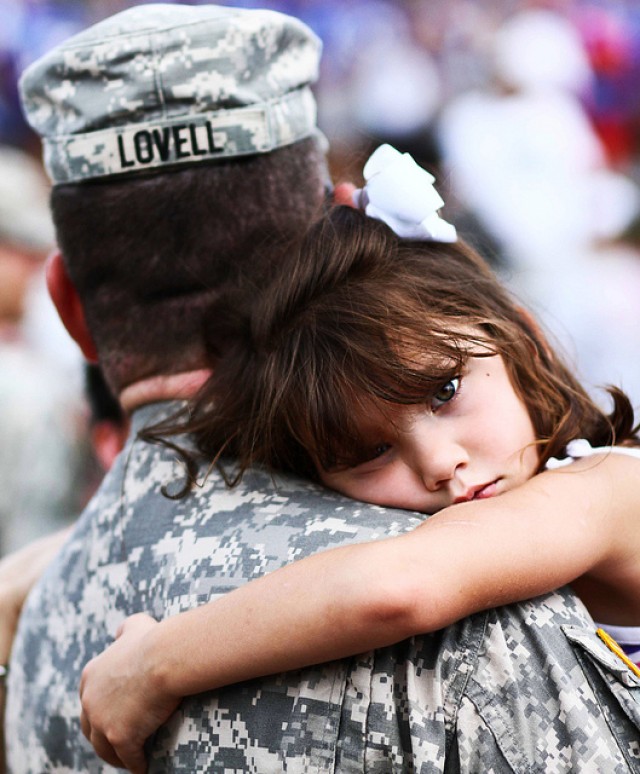WASHINGTON (Army News Service, Oct. 28, 2010) -- This year 142,000 Army children are dealing with their parent's deployment, said Assistant Secretary of the Army for Manpower and Reserve Affairs Thomas R. Lamont, adding that the Army is studying how they cope.
Lamont said Tuesday that information is being collected to find out how military children may be affected by future deployments through research today that follows youth as they mature. He kicked off the panel "America's Families: Our Children" at the Association of the United States Army's Annual Meeting and Exposition. Seven key panelists discussed the challenges that military youth face with parental deployment and re-integration.
"Strengths in adolescents lie in their ability to change," said Richard Lerner, director of the Institute for Applied Research in Youth Development at Tufts University.
Lerner said adolescence is the second most marked period of change in people's lives; the first is when they are infants.
Lerner cited one study that found children who were involved in the 4-H youth development program were more positively developed, more likely to have higher grades, more engaged in the community and had higher expectations for college. This study is important to the Army, he said, because there are 84,000 Army youth in 4-H.
Lerner's said the reasons for continuing such studies is because military children deserve to have policies and programs that fit their needs. Enhancing children's lives enhances the quality of military families, he added.
Amy Richardson, a policy researcher with the Rand Corporation, spoke on the topic of "Effects of Parental Deployment on Kids: Academic and Behavioral Health Changes."
Her study sampled children from a variety of states and a variety of military backgrounds - enlisted, officer, male, female, active duty and Reserve Component.
She said the study found that if the parent at home copes well with deployment, then so will the child. What is needed is more support in the schools, she stressed. The schools used in the study wanted to help, she explained, they wanted more information on military children and how to help them and when their parents deployed.
Angela Huebner, whose focus is on human development, marriage and family therapy at Virginia Polytechnic University, talked about adolescent adjustment and parental deployment lessons from the field.
In this study, researchers directly talked with children about what it's like to have a parent deployed. They focused on various stressors that affect a child's life.
Huebner said deployment is stressful for families and children and that adaption can be positive or negative. Children had higher levels of depression if the family climate was not coherent. If the family stayed strong and supportive, the children had lower levels of depression. The more attached a child is to their parent, the lower their depression level is. The less attached they are the higher their depression level .
Huebner quoted some of the children from the study. One child talked about how when their dad returned from a deployment, he acted as though he'd never left. Even though the children may have grown and matured in his absence, he treated them the same way he did before he left.
Huebner said some methods to help cope with deployment are to discuss the changes that will happen before they happen, to maintain consistent expectations and to recognize the impact of absence. One example of consistent expectations is the Family dinner. If it was an institution before a parent's deployment, it should be kept up during the deployment to maintain a sense of normalcy.
Shelley MacDonald-Wadsworth, the director of the Military Family Research Institute at Purdue University, discussed how important parents are to children during post-deployment changes.
The more anxiety a child faces the lower their school scores are, she said. Parents need to pay attention to their children and watch out for signs so they can be there for their child while they adjust to deployment.
Shirley Young, deputy director of Child and Youth Services at Family Morale, Welfare and Recreation Command, discussed the organization "A Back Pack Journalist," which helps military children open up and meet people who are in the same situation as them and talk about what they're going through.
The program helps children stay connected with their deployed parent. The group holds camps and encourages communication between the children so they can express their emotions. In one exercise, they give children cameras to take pictures, and then had them make a story out of the results. One child used pictures to tell the story of a 17-year-old friend who committed suicide. Young said the girl later admitted that it the first time she had ever been able to open up about the incident.
Kathleen Marin, director of Installation Services, Office of Assistant Chief of Staff for Installation Management, discussed the Army's efforts to combat the ill effects of deployment on children.
Out of Blue Star Families, Marin said 66 percent are confident schools are responsive to the children's situation; 33 percent sought counseling for either themselves or their children; and 71 percent reported they need additional help during deployments.
Marin mentioned the value of "give a hug dolls," which are made to help cheer up children while their parent is deployed. The dolls have a clear pocket on the face so that a facsimile of the parent's face can be placed there, and they can hug the doll in place of the missing parent.
Experts are still looking for better ways help children deal with the separations resulting from extended deployments, the panel concluded. While it can be a hard time for children, with the proper support and home life, they will get through it.


Social Sharing